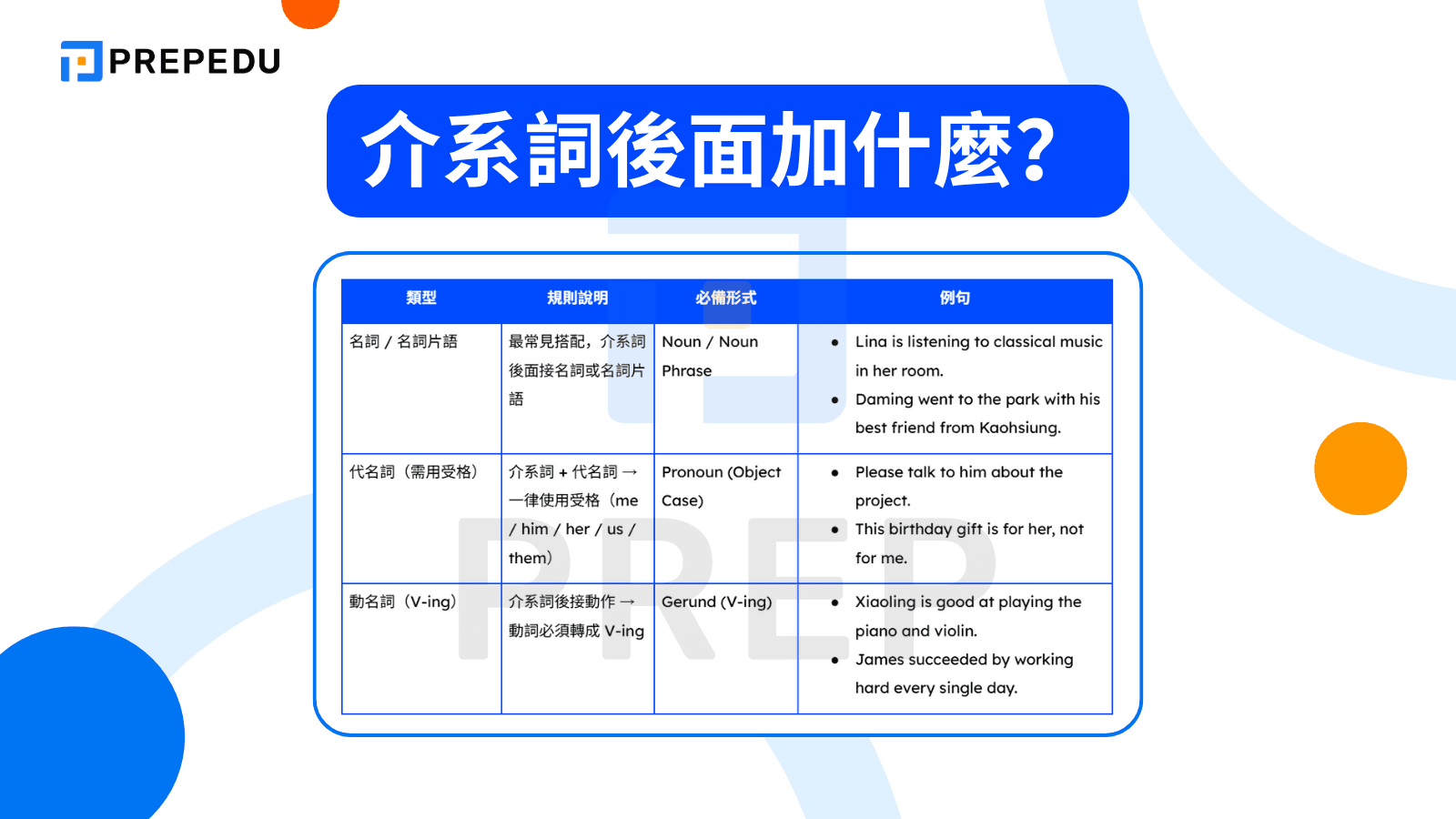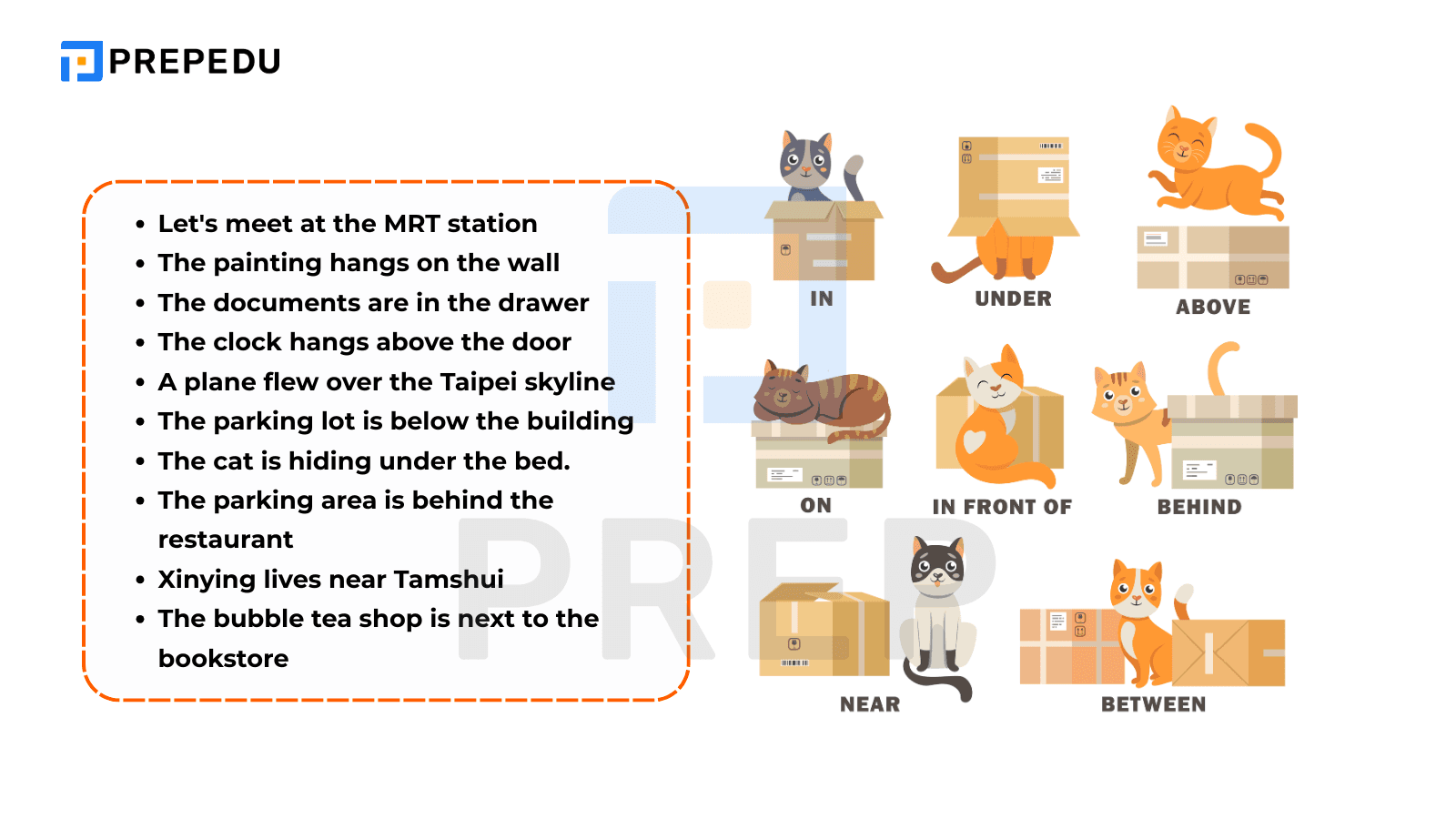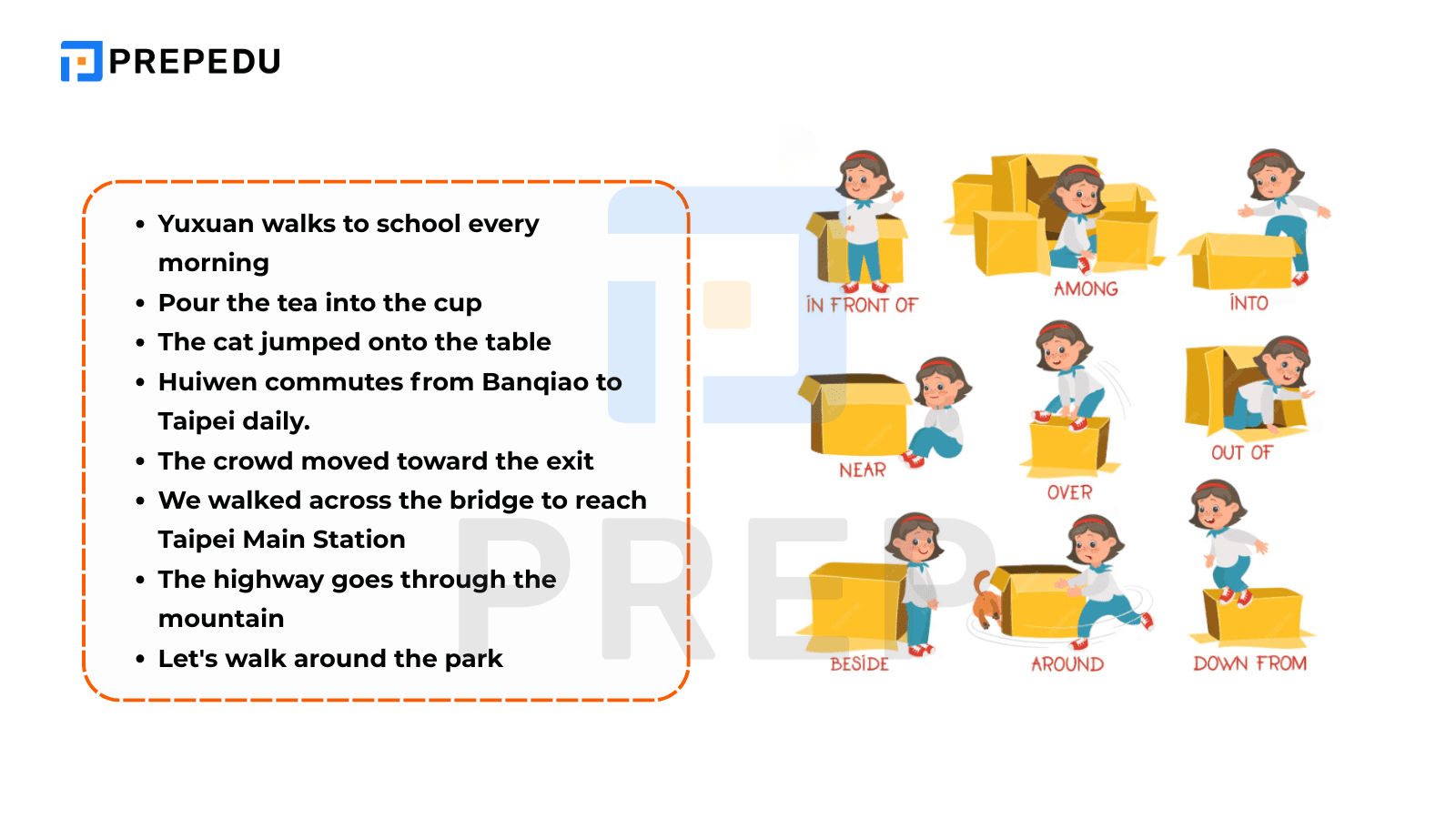介系詞英文【Preposition 全攻略】— 定義,分類,用法與例句大全
介系詞英文怎麼用?為什麼 at,in,on 總是搞混?介系詞英文(Preposition)是連接句子中名詞,代名詞與其他詞彙的關鍵詞類,主要用於表達時間,地點,方向,方式等關係。許多英文學習者在使用介系詞時常感到困惑,特別是面對「介系詞後面加什麼」,「如何分辨 to 是不是介系詞」等問題時更是不知所措。
想像一下,如果句子中沒有介系詞,我們就無法清楚說明「書在桌上」,「會議在星期一」或「搭捷運上班」這些日常表達。介系詞英文雖然字數短小,卻是讓英文句子完整,精確的重要螺絲釘。根據統計,英文中約有 150 個介系詞,但掌握最常用的 70 個就能應付大部分溝通情境。
本文由 PREPEDU 專業教學團隊撰寫,將為你完整解析介系詞的六大分類(時間,地點,方向,方式,原因,關係),60+ 個必學介系詞片語,常見易錯點,以及 30 道練習題含詳解。無論你是準備 TOEIC,IELTS 考試,或想提升日常英文溝通能力,這篇介系詞英文全攻略都能幫助你建立完整,系統化的學習架構。

I. 介系詞是什麼?(Preposition 是什麼?)
1. 介系詞英文意思與定義
什麼是介系詞?介系詞英文稱為 Preposition,源自拉丁文 "praeponere",意思是「放置在前面」。簡單來說,介系詞是一種用來建立名詞或代名詞與句子中其他字詞之間關係的詞類。何謂介系詞的核心功能?它主要用於表達時間,地點,方向,方法,原因等概念,幫助我們清楚描述事物之間的相對位置或關聯性。
介系詞意思看似抽象,但其實就像是句子中的「連接器」或「橋樑」,讓不同元素能夠產生有意義的連結。學習介系詞英文時,你會發現它們雖然字數不多,但卻是不可或缺的語言成分。
範例說明:
-
The book is on the table.(書在桌子上。)→ 介系詞 "on" 說明了書本與桌子之間的位置關係
-
Xiaowang arrived at Taipei Main Station before noon.(小王在中午之前抵達台北車站。)→ 介系詞 "at" 說明地點,介系詞 "before" 說明時間
2. 介系詞的功能與位置
介系詞英文在句子中扮演著關鍵角色,其主要功能與位置特點如下:
主要功能:
-
表示時間關係:說明事件發生的時間點或期間(at 5 p.m.,in March,on Monday)
-
表示空間位置:描述物體或人所在的地點(in Taipei,on the wall,at the airport)
-
表示移動方向:指出動作進行的方向(to Taichung,into the room,toward the exit)
-
表示方法工具:說明完成動作所使用的方式或工具(by train,with a pen)
-
表示原因目的:解釋行為背後的理由或意圖(for health,because of rain)
-
表示所屬關係:顯示事物之間的歸屬或關聯(a friend of mine,the capital of Taiwan)
句中位置特點:
-
通常位於名詞或代名詞之前
-
與其後的受詞共同形成介系詞片語(Prepositional Phrase)
-
在句子中作為修飾語,補充說明其他字詞
-
可以出現在句首,句中或句尾
實用範例:Minghua works in Taipei and commutes by MRT every day.(明華在台北工作,每天搭捷運通勤。)→ "in Taipei" 說明工作地點,"by MRT" 說明交通方式
II. 介系詞英文核心規則:介系詞後面加什麼?
理解介系詞後面加什麼是掌握英文介系詞用法的關鍵。介系詞規則的核心觀念是:介系詞後面必須接「受詞」(Object),而這個受詞可以是三種形式之一。這個規則在所有介系詞英文的應用中都必須遵守。
1. 名詞(Noun)或名詞片語(Noun Phrase)
介系詞英文最常見的搭配方式是接續英文名詞或名詞片語。名詞片語可以是單一名詞,也可以包含修飾語,形成更複雜的結構。範例:
-
Lina is listening to classical music in her room.(麗娜正在房間裡聽古典音樂。)
-
Daming went to the park with his best friend from Kaohsiung.(大明和他來自高雄的好朋友一起去公園。)
-
Chen Wei left the office after the important business meeting.(陳偉在重要的商務會議後離開辦公室。)
-
The restaurant near Taipei 101 serves excellent dumplings.(台北 101 附近的那家餐廳供應很棒的水餃。)
2. 代名詞(Pronoun)- 必須用受格
當介系詞英文後面要接代名詞時,必須使用受格形式 (me,him,her,us,them),而非主格 (I,he,she,we,they)。這是許多學習者容易犯錯的地方。範例:
-
Please talk to him about the project.(請跟他談談這個專案。)
-
This birthday gift is for her, not for me.(這個生日禮物是給她的,不是給我的。)
-
Come shopping with us this weekend.(這個週末跟我們一起去購物。)
-
The teacher explained the grammar rules to them patiently.(老師耐心地向他們解釋文法規則。)
記憶技巧:如果介系詞後面可以放人名(如 "talk to John"),那就要用代名詞的受格(talk to him)。
3. 動名詞(Gerund - V-ing)
當介系詞英文後面需要接續一個「動作」時,該動詞必須轉換成動名詞形式 (V-ing)。這個介系詞規則非常重要,也是考試中的常見考點。
範例:
-
Xiaoling is good at playing the piano and violin.(小玲擅長彈鋼琴和小提琴。)
-
James succeeded by working hard every single day.(James 透過每天努力工作而成功。)
-
Thank you for helping me move to my new apartment.(謝謝你幫我搬到新公寓。)
-
Chen is interested in learning Japanese culture.(小陳對學習日本文化感興趣。)
-
After finishing dinner, we went for a walk in Daan Park.(吃完晚餐後,我們去大安森林公園散步。)
重要提醒:記住這個介系詞規則:介系詞 + 動詞 = 介系詞 + V-ing(永遠不會是原形動詞)

III. 英文介系詞用法:最常見的分類方式
介系詞英文中數量眾多,約有 150 個不同的介系詞。掌握分類方式能幫助你更有系統地學習和記憶。以下按功能將介系詞英文用法分為六大類別,每個類別都提供完整的介系詞清單和實用例句。
1. 時間介系詞英文(Prepositions of Time)
時間介系詞是日常使用頻率最高的介系詞英文類別。掌握時間介系詞能讓你準確表達事件發生的時間。
|
介系詞 |
使用時機與規則 |
實用例句 |
|
at |
|
|
|
on |
|
|
|
in |
|
|
|
during |
|
|
|
for |
|
|
|
since |
|
|
|
before |
|
|
|
after |
|
|
|
until / till |
|
|
|
by |
|
|
|
within |
|
|
|
from...to |
|
|
2. 地點介系詞(Prepositions of Place)
英文位置介系詞用於描述物體或人所在的位置關係,是介系詞英文中非常重要的一個類別。
|
介系詞 |
使用情境與規則 |
實用例句 |
|
at |
|
|
|
on |
|
|
|
in |
|
|
|
above |
|
|
|
over |
|
|
|
below |
|
|
|
under |
|
|
|
in front of |
|
|
|
behind |
|
|
|
near |
|
|
|
by / beside |
|
|
|
next to |
|
|
|
between |
|
|
|
among |
|
|
|
inside |
|
|
|
outside |
|
|
|
opposite |
|
|

3. 英文日期介系詞(Prepositions for Dates)
英文日期介系詞主要用來說明「某件事情發生的日期、星期或具體時間點」,屬於時間介系詞(Prepositions of Time)的一部分。 掌握日期介系詞的用法能幫助你在書寫或口說英文時更自然、準確地表達時間。最常用的日期介系詞有 at、on、in、by、before、after、from...to... 等。
|
介系詞 |
使用時機與規則 |
實用例句 |
|
on |
用於「具體日期」與「星期幾」 |
|
|
at |
用於「具體時間點」 |
|
|
in |
用於「月份、季節、年份、較長時間」 |
|
|
by |
表示「不晚於某日期」 |
|
|
before |
表示「在...之前」 |
|
|
after |
表示「在...之後」 |
|
|
from...to... |
表示「從...到...的日期範圍」 |
|
4. 方向與移動介系詞(Prepositions of Direction & Movement)
這類介系詞英文描述移動的方向或路徑,對於表達動作的進行方向非常重要。
|
介系詞 |
意義與用法 |
實用例句 |
|
to |
|
|
|
into |
|
|
|
onto |
移動到表面上 |
|
|
from |
|
|
|
toward(s) |
|
|
|
across |
|
|
|
through |
|
|
|
along |
沿著 |
|
|
around |
環繞,周圍 |
|
|
up |
向上 |
|
|
down |
向下 |
|
|
past |
經過 |
|
|
out of |
從...出來 |
|
|
off |
|
|

5. 方式與工具介系詞英文(Prepositions of Manner & Instrument)
用於說明完成動作的方法或使用的工具,這類介系詞英文在描述「如何」做某事時非常重要。
|
介系詞 |
使用情境 |
實用例句 |
|
by |
|
|
|
with |
|
|
|
in |
方式,風格 語言 |
|
|
through |
藉由,透過 |
|
|
on |
|
|
6. 原因與目的介系詞(Prepositions of Reason & Purpose)
說明行為的原因或目的,這類介系詞英文幫助我們理解「為什麼」做某事。
|
介系詞 |
用法說明 |
實用例句 |
|
for |
|
|
|
because of |
|
|
|
due to |
|
|
|
owing to |
|
|
|
from |
|
|
|
of |
原因(情緒) |
|
|
out of |
出自(動機) |
|
7. 關係與所屬介系詞(Prepositions of Relation & Origin)
表達事物之間的關係或來源,這是介系詞英文中描述連結性的重要類別。
|
介系詞 |
功能說明 |
實用例句 |
|
of |
|
|
|
with |
|
|
|
from |
|
|
|
about |
關於 |
|
|
on |
關於(較正式,學術) |
|
|
between |
兩者關係 |
|
|
against |
|
|
IV. 必學介系詞英文片語
介系詞片語是由「介系詞 + 其受詞」組成的固定結構,在句子中常扮演形容詞或副詞的角色。掌握常用的介系詞英文片語能讓你的英文表達更自然流暢,這些片語也是 TOEIC,GEPT,IELTS 等考試的高頻考點。
1. 以 on 開頭的介系詞片語
|
介系詞片語 |
意思 |
例句 |
|
depend on |
依賴,取決於 |
|
|
focus on |
專注於 |
|
|
insist on |
堅持 |
|
|
count on |
依靠,指望 |
|
|
work on |
致力於 |
|
|
based on |
基於 |
|
|
comment on |
評論 |
|
2. 以 in 開頭的介系詞英文片語
|
介系詞片語 |
意思 |
例句 |
|
interested in |
對...感興趣 |
|
|
succeed in |
成功做到 |
|
|
believe in |
相信 |
|
|
participate in |
參與 |
|
|
result in |
導致 |
|
|
specialize in |
專精於 |
|
|
engage in |
從事,參與 |
|
3. 以 at 開頭的介系詞英文片語
|
介系詞片語 |
意思 |
例句 |
|
good at |
擅長於 |
|
|
look at |
看 |
|
|
laugh at |
嘲笑 |
|
|
arrive at |
抵達(小地方) |
|
|
aim at |
針對,瞄準 |
|
4. 以 for 開頭的介系詞英文片語
|
介系詞片語 |
意思 |
例句 |
|
look for |
尋找 |
|
|
wait for |
等待 |
|
|
apply for |
申請 |
|
|
apologize for |
為...道歉 |
|
|
prepare for |
為...準備 |
|
|
famous for |
以...聞名 |
|
|
responsible for |
對...負責 |
|
5. 以 to 開頭的介系詞英文片語
|
介系詞片語 |
意思 |
例句 |
|
listen to |
聆聽 |
|
|
talk to |
與...交談 |
|
|
belong to |
屬於 |
|
|
refer to |
提到,參考 |
|
|
lead to |
導致 |
|
|
contribute to |
貢獻,促成 |
|
|
object to |
反對 |
|
6. 以 of 開頭的介系詞英文片語
|
介系詞片語 |
意思 |
例句 |
|
be proud of |
以...為傲 |
|
|
be afraid of |
害怕 |
|
|
be aware of |
意識到 |
|
|
consist of |
由...組成 |
|
|
take care of |
照顧 |
|
|
think of |
想到 |
|
|
be capable of |
有能力 |
|
7. 以 about 開頭的介系詞英文片語
|
介系詞片語 |
意思 |
例句 |
|
worry about |
擔心 |
|
|
think about |
思考 |
|
|
care about |
在意,關心 |
|
|
complain about |
抱怨 |
|
8. 以 with 開頭的介系詞英文片語
|
介系詞片語 |
意思 |
例句 |
|
agree with |
同意 |
|
|
deal with |
處理 |
|
|
communicate with |
與...溝通 |
|
|
be satisfied with |
對...滿意 |
|
|
be familiar with |
熟悉 |
|
V. 學習難點解析:如何分辨 to 是不是介系詞英文?
許多學習者困惑「如何分辨 to 是不是介系詞」。這個問題在介系詞英文學習中非常重要,因為 to 可以作為「不定詞」的一部分,也可以作為「介系詞」使用,兩者的後接形式完全不同。
1. 不定詞 to vs. 介系詞 to 完整比較
|
比較項目 |
不定詞 to |
介系詞 to |
|
文法功能 |
不定詞的標記 (to + 原形動詞) |
介系詞,需要受詞 |
|
後面接續 |
原形動詞 (V) |
名詞 / 代名詞 / 動名詞 (V-ing) |
|
中文意思 |
通常無特定意思,表示「要做...」或目的 |
通常有「到,向,朝,對於」等方向性意思 |
|
範例 1 |
Xiaoming needs to study for the exam. (小明需要為考試而讀書。) |
Huimin is looking forward to meeting her friends from Tainan. (惠敏期待見到她台南的朋友。) |
|
範例 2 |
Yaling wants to travel to Japan next year. (雅玲明年想去日本旅行。) |
Zhiwei is accustomed to living alone in Taipei. (志偉習慣在台北獨自生活。) |
|
範例 3 |
The company plans to expand its business. (公司計劃擴展業務。) |
Chen objected to changing the schedule. (小陳反對更改時程。) |
|
範例 4 |
I decided to learn Spanish. (我決定學西班牙文。) |
She is committed to improving her English. (她致力於提升她的英文。) |
|
句型結構 |
主詞 + 動詞 + to + V原形 |
主詞 + be + 形容詞 + to + V-ing/N |
2. 常見使用「介系詞 to」的片語清單
以下片語中的 to 是介系詞英文,後面必須接名詞或 V-ing:
|
介系詞 to 片語 |
意思 |
例句 |
|
look forward to + V-ing/N |
期待 |
|
|
be used to + V-ing/N |
習慣於 |
|
|
be accustomed to + V-ing/N |
習慣於(較正式) |
|
|
object to + V-ing/N |
反對 |
|
|
devote oneself to + V-ing/N |
致力於 |
|
|
pay attention to + V-ing/N |
注意 |
|
|
contribute to + V-ing/N |
貢獻於 |
|
|
be dedicated to + V-ing/N |
致力於 |
|
|
be opposed to + V-ing/N |
反對 |
|
|
admit to + V-ing |
承認 |
|
|
confess to + V-ing |
坦承 |
|
|
in addition to + V-ing/N |
除了...之外 |
|
2. 判斷技巧與方法
|
技巧 1:替換測試法 |
如果 to 後面可以接名詞且語意通順,那麼這個 to 就是介系詞。
|
|
技巧 2:前面字詞判斷法 |
某些固定片語中的 to 永遠是介系詞:
|
|
技巧 3:意義判斷法 |
|
VI. 介系詞練習題與解析
透過實際練習能幫助你更深入理解介系詞英文的用法。以下提供三種類型的練習題,請先自行作答,再參考解析。
1. 選擇題練習
請選擇正確的介系詞英文填入空格:
-
The meeting will be held _____ Monday morning. (A) at (B) on (C) in
-
Xiaoming usually wakes up _____ 6:30 a.m. to prepare breakfast. (A) at (B) on (C) in
-
Taiwan's Dragon Boat Festival is _____ the fifth day of the fifth lunar month. (A) at (B) on (C) in
-
Huimin arrived _____ Taoyuan Airport three hours before her flight. (A) at (B) on (C) in
-
There is a famous landscape painting hanging _____ the wall in the lobby. (A) at (B) on (C) in
-
Yaling has lived _____ Tainan since she was born. (A) at (B) on (C) in
-
The Olympic Games will take place _____ 2028 in Los Angeles. (A) at (B) on (C) in
-
Let's meet _____ the bubble tea shop next to Taipei Main Station. (A) at (B) on (C) in
-
Chen was born _____ March 15th, 1998. (A) at (B) on (C) in
-
Please place all the textbooks _____ the bookshelf carefully. (A) at (B) on (C) in
答案與詳細解析:
-
(B) on - 特定日期的早上用 on。"Monday morning" 是特定的星期加時段,需要用 on。
-
(A) at - 具體時間點用 at。"6:30 a.m." 是明確的時刻,使用 at。
-
(B) on - 特定日期用 on。即使是農曆日期,仍然是特定的一天,要用 on。
-
(A) at - 特定地點(機場、車站等交通樞紐)用 at。機場屬於具體地點,使用 at。
-
(B) on - 表面接觸用 on。畫掛在牆上,與牆面接觸,用 on。
-
(C) in - 城市、國家等較大地理區域用 in。台南是城市,使用 in。
-
(C) in - 年份用 in。2028 是年份,用 in。
-
(A) at - 特定小地點用 at。"bubble tea shop" 是具體的小地點,用 at。
-
(B) on - 完整的特定日期用 on。"March 15th, 1998" 是完整日期,用 on。
-
(B) on - 放置在平面表面上用 on。書架的層板是平面,書放在上面用 on。
2. 填空題練習
請判斷 to 是介系詞還是不定詞,並填入動詞的正確形式:
-
Minghua wants _____ (visit) the National Palace Museum this weekend.
-
Yujie is looking forward _____ (meet) her host family in Taipei.
-
Xiaojie needs _____ (finish) the report before tomorrow morning.
-
The employees are accustomed _____ (work) flexible hours at this company.
-
Wenling plans _____ (study) abroad in the United States next year.
-
Many environmental groups object _____ (build) more factories in the area.
-
Zhiwei would like _____ (learn) to play traditional Chinese instruments.
-
Liling is used _____ (commute) by MRT from Banqiao to Taipei every day.
-
The school decided _____ (cancel) classes due to the approaching typhoon.
-
Customers should pay attention _____ (read) the terms and conditions carefully.
答案與詳細解析:
-
to visit - 不定詞。"want" 後面接 to + 原形動詞,表示「想要做某事」。 完整句: Minghua wants to visit the National Palace Museum this weekend. (明華這週末想參觀故宮博物院。)
-
to meeting - 介系詞。"look forward to" 是固定片語,to 是介系詞,後接 V-ing。 完整句: Yujie is looking forward to meeting her host family in Taipei. (宇杰期待在台北見到她的寄宿家庭。)
-
to finish - 不定詞。"need" 後面接 to + 原形動詞,表示「需要做某事」。 完整句: Xiaojie needs to finish the report before tomorrow morning. (小杰需要在明天早上前完成報告。)
-
to working - 介系詞。"be accustomed to" 是固定片語,to 是介系詞,後接 V-ing。 完整句: The employees are accustomed to working flexible hours at this company. (員工習慣在這家公司彈性工時。)
-
to study - 不定詞。"plan" 後面接 to + 原形動詞,表示「計劃做某事」。 完整句: Wenling plans to study abroad in the United States next year. (文玲計劃明年到美國留學。)
-
to building - 介系詞。"object to" 是固定片語,to 是介系詞,後接 V-ing。 完整句: Many environmental groups object to building more factories in the area. (許多環保團體反對在該地區興建更多工廠。)
-
to learn - 不定詞。"would like" 後面接 to + 原形動詞,表示「想要做某事」。 完整句: Zhiwei would like to learn to play traditional Chinese instruments. (志偉想學習演奏中國傳統樂器。)
-
to commuting - 介系詞。"be used to" 是固定片語,to 是介系詞,後接 V-ing。 完整句: Liling is used to commuting by MRT from Banqiao to Taipei every day. (麗玲習慣每天從板橋搭捷運通勤到台北。)
-
to cancel - 不定詞。"decide" 後面接 to + 原形動詞,表示「決定做某事」。 完整句: The school decided to cancel classes due to the approaching typhoon. (學校因為颱風接近而決定停課。)
-
to reading - 介系詞。"pay attention to" 是固定片語,to 是介系詞,後接 V-ing。 完整句: Customers should pay attention to reading the terms and conditions carefully. (客戶應該注意仔細閱讀條款和條件。)
3. 動名詞與介系詞結合練習
請使用正確的「介系詞 + V-ing」結構完成句子:
-
Thank you _____ (help) me move my furniture to the new apartment in Xindian.
-
Xiaoxuan is good _____ (solve) complex mathematical problems quickly.
-
Daming succeeded _____ (get) promoted to manager after working hard for three years.
-
Most young people in Taiwan are interested _____ (learn) new languages and cultures.
-
Huiwen is thinking _____ (change) her major from business to design.
-
Zhiming apologized _____ (arrive) late to the important client meeting.
-
This restaurant in Taichung is famous _____ (serve) authentic local cuisine.
-
Yuxin is excited _____ (start) her new job at the technology company in Taipei.
-
Liming is tired _____ (work) overtime every day without proper rest.
-
The team focuses _____ (improve) customer satisfaction and service quality.
答案與詳細解析:
-
for helping - "thank you for" 是固定搭配,for 是介系詞,後接 V-ing。 完整句: Thank you for helping me move my furniture to the new apartment in Xindian. (謝謝你幫我把家具搬到新店的新公寓。)
-
at solving - "good at" 表示「擅長於」,at 是介系詞,後接 V-ing。 完整句: Xiaoxuan is good at solving complex mathematical problems quickly. (小萱擅長快速解決複雜的數學問題。)
-
by getting / in getting - "succeed by/in" 表示「透過...而成功」,後接 V-ing。 完整句: Daming succeeded in getting promoted to manager after working hard for three years. (大明在努力工作三年後成功升職為經理。)
-
in learning - "interested in" 表示「對...感興趣」,in 是介系詞,後接 V-ing。 完整句: Most young people in Taiwan are interested in learning new languages and cultures. (台灣大多數年輕人對學習新語言和文化感興趣。)
-
about changing - "think about" 表示「思考、考慮」,about 是介系詞,後接 V-ing。 完整句: Huiwen is thinking about changing her major from business to design. (惠文在考慮把主修從商業改為設計。)
-
for arriving - "apologize for" 表示「為...道歉」,for 是介系詞,後接 V-ing。 完整句: Zhiming apologized for arriving late to the important client meeting. (志明為重要客戶會議遲到而道歉。)
-
for serving - "famous for" 表示「以...聞名」,for 是介系詞,後接 V-ing 或名詞。 完整句: This restaurant in Taichung is famous for serving authentic local cuisine. (這家台中餐廳以供應道地的在地美食而聞名。)
-
about starting - "excited about" 表示「對...感到興奮」,about 是介系詞,後接 V-ing。 完整句: Yuxin is excited about starting her new job at the technology company in Taipei. (宇欣對在台北科技公司開始新工作感到興奮。)
-
of working - "tired of" 表示「對...感到厭倦」,of 是介系詞,後接 V-ing。 完整句: Liming is tired of working overtime every day without proper rest. (李明厭倦每天加班而沒有適當休息。)
-
on improving - "focus on" 表示「專注於」,on 是介系詞,後接 V-ing。 完整句: The team focuses on improving customer satisfaction and service quality. (團隊專注於提升客戶滿意度和服務品質。)
VII. 介系詞英文常見問題 (FAQ)
1. 介系詞英文縮寫是什麼?
介系詞英文 (Preposition) 在字典、文法書或學術文獻中,最常見的英文縮寫是 prep。這個介系詞縮寫被廣泛使用於各種英文學習教材、字典標注和文法參考資料中,幫助讀者快速識別詞性。
2. 英文介系詞有哪些?總共有多少?(Preposition 有哪些英文?)
英文介系詞總數約有 150 個,但日常溝通中最常使用的大約 70-80 個。掌握常用的介系詞英文就能應付大部分的日常溝通和考試需求。
3. 句子最後可以是介系詞嗎?
可以! 這是一個常見的誤解。雖然傳統英文文法教學曾建議避免將介系詞英文放在句尾,但在現代英文中,尤其是口語和非正式書寫中,句尾出現介系詞是非常自然且常見的用法。
常見且正確的範例:
-
What are you looking for? (你在找什麼?) ✓ 比較:~~For what are you looking?~~ (過於正式,不自然)
-
Who did you go with? (你和誰去的?) ✓ 比較:~~With whom did you go?~~ (過於正式)
-
Which hotel are you staying at? (你住在哪間飯店?) ✓ 比較:~~At which hotel are you staying?~~ (過於正式)
-
This is the restaurant I told you about. (這就是我跟你說的那家餐廳。) ✓
使用情境:
-
疑問句中特別常見
-
關係子句中
-
口語對話中
-
非正式寫作中
唯一例外:在非常正式的學術寫作或商業文件中,可能需要避免句尾介系詞,但這不是文法錯誤,只是風格選擇。
4. at,on,in 怎麼區分?
這三個是最常混淆的介系詞英文。記住「從小到大」的原則:
|
時間用法 |
地點用法 |
|
|
範例對比:
-
at 3 p.m. / on Monday / in March (時間)
-
at the station / on the wall / in the room (地點)
結論
掌握介系詞英文是提升英文能力的重要里程碑。從理解介系詞是什麼,介系詞後面加什麼,到熟練運用各類介系詞英文和介系詞片語,這個學習過程需要時間和練習。一張圖搞懂介系詞能幫助你快速統整重點,建立完整概念。本文詳細介紹了介系詞的定義,六大分類,常用片語,以及重要的介系詞英文規則,特別是如何分辨 to 是不是介系詞這個常見難題。
對 IELTS 和 TOEIC 考試格式感到不熟悉?陌生的考試環境會阻礙你的表現。PREPEDU 的 Test Practice 重現真實考場氛圍,幫助你掌握題型和答題節奏。
豐富的 IELTS 真題和 TOEIC 題型題庫涵蓋超過一千道精選練習題,持續更新以追蹤考試趨勢,收錄高頻題目。智能分析工具深入檢視每個錯誤,提供個人化學習建議,助你快速突破。
獨特的視覺化學習路徑讓你在每個階段見證顯著進步。成功就在眼前。把握機會拉開與對手的差距。
立即開始 PREP 練習,自信迎接挑戰。現在就體驗 IELTS 和 TOEIC 備考!

你好!我叫黃秋賢。現在在網站 prepedu.com 的部落格擔任產品內容經理。
我有超過5年的英語、韓語等外語自學經驗,並準備過 IELTS、TOEIC、TOPIK 等考試,累積了豐富的實戰知識,也曾協助數千位在語言學習上遇到困難的人。希望以上的分享能幫助大家在家中更有效率地自學!
評論











